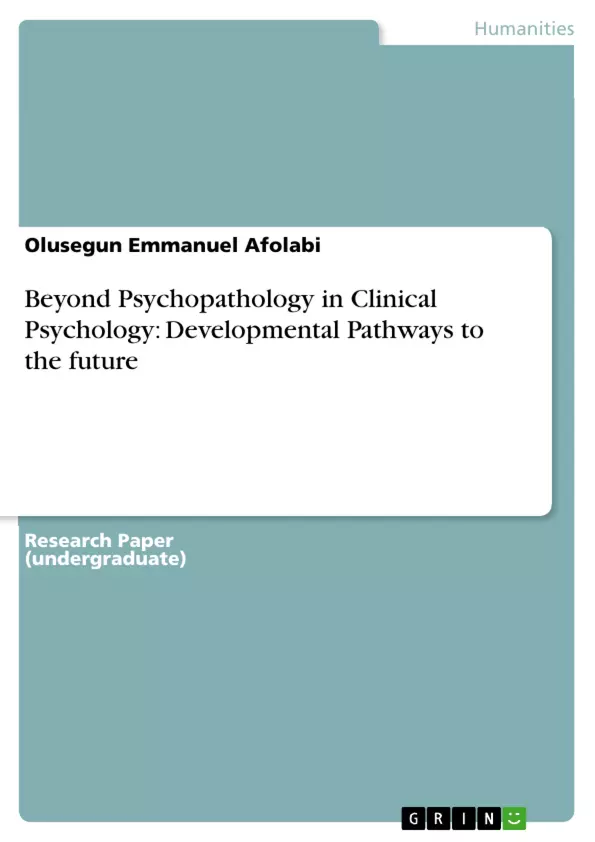Evidence in the past two decades on psychopathology has come up with a suggestion that research should to toy the line of dynamism and innovativeness, both in theory and practice. Drawing together outcomes from various psychopathology’s studies, this article presents an overview on the need to move beyond psychopathology and clinical intervention and embraces developmental perspectives to elucidate adaptive and maladaptive in human behaviour and functioning The paper highlights the need for professionals in the field of clinical psychology to shoulder the policy of equivalence that gives developmental perspectives the same treatment and status enjoy by psychopathology. In realizing this objective, this paper highlights and addresses three underlying themes: 1) to understand the fact that amelioration of psychosocial problems, needs a multidisciplinary and multidimensional quality and experiential consideration from other disciplines, 2) analyse how the field of clinical psychology and mental health in general gain from assessing psychopathology from developmental perspectives, 3) examine behavioral, emotional and learning problems using the principles, advancement and prospect of developmental paradigm to address the concept, challenges and variances associated with human psychopathology. Finaly, the study concludes that a continued and expanded interface between normal and atypical development,coupled with interdisciplinary perspective, if fostered, will create an inspiring innovative epoch of hypothetical and experiential work in developmental sciences.
Table of Contents
- Abstract
- Introduction
- Purpose of study
Objectives and Key Themes
This paper aims to advocate for a shift in clinical psychology, moving beyond a sole focus on psychopathology towards a more integrated developmental perspective. It emphasizes the need for equal consideration of developmental factors alongside psychopathological diagnoses in understanding and addressing human behavior.
- The multidisciplinary and multidimensional nature of psychosocial problem amelioration.
- The benefits of assessing psychopathology through a developmental lens.
- Analyzing behavioral, emotional, and learning problems using a developmental paradigm.
- The importance of integrating normal and atypical development.
- The need for an interdisciplinary approach to understanding psychopathology.
Chapter Summaries
Abstract: This abstract introduces the paper's central argument: the need for clinical psychology to adopt a more dynamic and innovative approach, incorporating developmental perspectives alongside traditional psychopathological frameworks. It highlights the importance of understanding both adaptive and maladaptive behaviors within a developmental context and advocates for equal consideration of developmental and psychopathological perspectives in clinical practice and research.
Introduction: The introduction establishes the context for the paper by discussing the limitations of solely relying on psychopathology to understand human behavior. It cites Kuhn's work on scientific revolutions to argue that existing paradigms, like the focus on psychopathology, should be reevaluated when confronted with anomalies that challenge the current understanding. The introduction highlights the increasing prevalence of psychopathological labels and the potential for misdiagnosis, emphasizing the need for a broader, developmental approach to address the complexities of human behavior and functioning.
Purpose of study: This section outlines the paper's objectives. It reiterates the call for a balanced approach, giving equal weight to developmental perspectives and psychopathological understandings in clinical psychology. The main goals are to explore the multidisciplinary nature of addressing psychosocial problems and to demonstrate the advantages of using a developmental lens to assess psychopathology. The section also highlights the use of empirical analysis to move beyond simplistic clinical intervention models.
Keywords
Psychopathology, developmental psychopathology, developmental perspective, behavioral problems, emotional problems, learning problems, interdisciplinary approach, multidimensional approach, clinical psychology, mental health.
Frequently Asked Questions: A Comprehensive Language Preview
What is the main argument of this paper?
The paper advocates for a significant shift in clinical psychology, moving beyond a sole focus on psychopathology towards a more integrated developmental perspective. It argues for equal consideration of developmental factors alongside psychopathological diagnoses in understanding and addressing human behavior.
What are the key themes explored in this paper?
Key themes include the multidisciplinary and multidimensional nature of addressing psychosocial problems, the benefits of assessing psychopathology through a developmental lens, analyzing behavioral, emotional, and learning problems using a developmental paradigm, the importance of integrating normal and atypical development, and the need for an interdisciplinary approach to understanding psychopathology.
What are the limitations of focusing solely on psychopathology, as discussed in the paper?
The paper argues that solely relying on psychopathology to understand human behavior is limiting. It suggests that existing paradigms focusing primarily on psychopathology should be reevaluated, especially when faced with anomalies that challenge the current understanding. The increasing prevalence of psychopathological labels and the potential for misdiagnosis are also highlighted as limitations.
What is the purpose of this study, as outlined in the paper?
The study aims to explore the multidisciplinary nature of addressing psychosocial problems and to demonstrate the advantages of using a developmental lens to assess psychopathology. It seeks to promote a balanced approach, giving equal weight to developmental perspectives and psychopathological understandings in clinical psychology and move beyond simplistic clinical intervention models through empirical analysis.
What is the structure of the preview?
The preview provides a comprehensive overview, including the title, table of contents (covering the abstract, introduction, and purpose of the study), objectives and key themes, chapter summaries, and keywords. It offers a structured and professional analysis of the themes within the text.
What are the keywords associated with this paper?
Keywords include Psychopathology, developmental psychopathology, developmental perspective, behavioral problems, emotional problems, learning problems, interdisciplinary approach, multidimensional approach, clinical psychology, and mental health.
What is the approach advocated by the paper regarding clinical intervention?
The paper advocates for a more dynamic and innovative approach to clinical psychology, incorporating developmental perspectives alongside traditional psychopathological frameworks. It emphasizes the need to understand both adaptive and maladaptive behaviors within a developmental context and to move beyond simplistic models through empirical analysis.
How does the paper utilize Kuhn's work?
The paper cites Kuhn's work on scientific revolutions to support the argument that existing paradigms, like the focus on psychopathology, should be reevaluated when confronted with anomalies that challenge the current understanding.
- Quote paper
- Olusegun Emmanuel Afolabi (Author), 2013, Beyond Psychopathology in Clinical Psychology: Developmental Pathways to the future, Munich, GRIN Verlag, https://www.grin.com/document/271962



